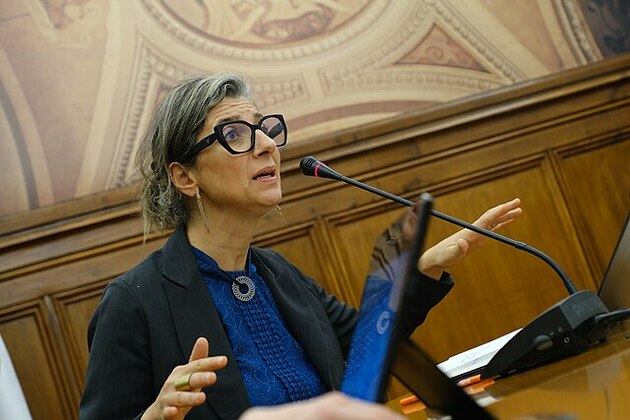Gender equal leadership makes all kinds of sense
ANI PR Wire
15 Mar 2023, 12:45 GMT+10

New Delhi [India], March 15 (ANI/PNN): Gender equality is off track - according to a recent report by the United Nations, 300 years off track. In a world of multiple crises, we find it surprising that gender equality is not a priority for most political leaders. Mounting evidence shows that the health and resilience of our communities and economies depends on women being at the decision-making table - and they should fill half the seats there.
Yet women occupy a minority of leadership roles across sectors and just 28 of 194 countries are led by women. The consequences of this inequity were exemplified during the COVID-19 pandemic emergency, since only a minority of countries were able to keep death rates relatively low and many of those that could, had governments led by women.
The COVID-19 pandemic also exacerbated gender inequality. It revealed immense vulnerabilities which can't be addressed unless governments acknowledge, invest in, and strengthen structures that support women and girls. It is a fair assumption that these acknowledgements, investments, and strengthening won't happen until we have more women in leadership roles.
During the pandemic, women across all sectors left the workforce as they were impacted by traditional gender roles, caretaking responsibilities, gender-discriminatory pay structures, unsafe work conditions and lack of social protection. For girls, school closures and other pressures exacerbated risks such as mental health challenges, violence, child marriage, pregnancy, female genital mutilation, and HIV infection. Millions of women and girls were left without access to sexual and reproductive health services. 11.2 million girls and young women were left at risk of not returning to education.
Job departures were particularly noticeable in the health workforce. Over 70 per cent of it is made up of women, many of whom are underpaid, unpaid, overworked, and/or in precarious jobs.
The many pressures created by conflicts and climate change are increasing poverty and gender inequality further, including through rising energy and living costs and inflation. Increased out-of-pocket payments for essential services also require many families to choose between accessing essential health services and clean water and food. In some countries, the most basic human rights of women and girls are being revoked, such as the right to education.
As leaders of networks and multi-stakeholder partnerships that work to make gender equality and health for all a reality, we call on Heads of State and Governments to prioritize and resource this agenda every time they meet. They have plenty of opportunities to do that this year, including at the G7 and G20, at the Bretton Woods meetings, at regional leadership dialogues, and with all member states of the United Nations including during the Sustainable Development Goal (SDG) Summit and the High-Level Meetings on health at this year's UN General Assembly.
To kick start the change, Helen Clark, Partnership for Maternal, Newborn, and Child Health (PMNCH) Board Chair; Phumzile Mlambo-Ngcuka, Women Deliver Board Chair; Maria Fernanda Espinosa Garces, Women in Global Health, Board Chair and Gabriela Cuevas Barron, UHC2030 Steering Committee Co-Chair offer a four-point International Women's Day plan (as published in The BMJ):
First, ensure that more women are in public and private sector leadership and decision-making roles and commit to gender parity by 2030. Women should be represented at all levels, from President to CEO to Director, on Boards and in managerial positions and as Ministers of important portfolios such as finance and foreign affairs. They must also be supported to stay in these demanding roles.
Second, ensure financial protection to minimize out-of-pocket health care payments so that all people can access the services they need. Advance progress on universal health coverage, so that everyone, everywhere can access quality health services, including comprehensive sexual and reproductive health services, without the risk of financial hardship.
Third, with women making up most of the health and care workforce, ensure gender equity in leadership, address underpaid and unpaid work with adequate remuneration, close the gender pay gap, and invest in safe and decent work. Deliver training opportunities and violence- and discrimination-free environments for all health workers. This is beneficial for the quality of care, and the resilience of health systems, making us all less vulnerable to emergencies.
Fourth, we need to collect and analyze sex- and gender-disaggregated data, and practice gender-based budgeting, to ensure gender-responsive and gender-transformative policies that leave no one behind.
We need world leaders to focus on women and girls on International Women's Day and on the other 364 days of the year. Everyone will benefit.
This story is provided by PNN. ANI will not be responsible in any way for the content of this article. (ANI/PNN)
 Share
Share
 Tweet
Tweet
 Share
Share
 Flip
Flip
 Email
Email
Watch latest videos
Subscribe and Follow
Get a daily dose of South East Asia Post news through our daily email, its complimentary and keeps you fully up to date with world and business news as well.
News RELEASES
Publish news of your business, community or sports group, personnel appointments, major event and more by submitting a news release to South East Asia Post.
More InformationInternational
SectionWhite House meeting between Trump, Netanyahu on July 7
WASHINGTON, D.C.: President Donald Trump will meet Israeli Prime Minister Benjamin Netanyahu at the White House on Monday. President...
Over 60 companies named in UN report on Israel-Gaza conflict
GENEVA, Switzerland: A new United Nations report alleges that dozens of global corporations are profiting from and helping sustain...
UK lawmakers desigate protest group as terrorist organization
LONDON, UK - Lawmakers in the United Kingdom have voted overwhelmingly to proscribe the direct-action group Palestine Action as a terrorist...
Dalai Lama to address Buddhist conference, reveal succession plan
DHARAMSHALA, India: The Dalai Lama is set to address a significant three-day conference of Buddhist leaders this week, coinciding with...
US Supreme Court backs Texas efforts to shield minors online
WASHINGTON, D.C.: In a significant ruling last week, the U.S. Supreme Court upheld a Texas law requiring age verification for users...
Turkey, France battle wildfires amid early Europe heatwave
ISTANBUL/PARIS/BRUSSELS: As searing temperatures blanket much of Europe, wildfires are erupting and evacuation orders are being issued...
Business
SectionGrammarly acquires Superhuman to boost AI workplace tools
SAN FRANCISCO, California: Grammarly is doubling down on AI-powered productivity tools with the acquisition of Superhuman, a sleek...
Standard and Poor's 500 and and Nasdaq Composite close at record highs
NEW YORK, New York -U.S. stock markets closed with broad gains on Thursday, led by strong performances in U.S. tech stocks, while European...
Persson family steps up H&M share purchases, sparks buyout talk
LONDON/STOCKHOLM: The Persson family is ramping up its investment in the H&M fashion empire, fueling renewed speculation about a potential...
L'Oreal to buy Color Wow, boosts premium haircare portfolio
PARIS, France: L'Oréal is making a fresh play in the booming premium haircare segment with a new acquisition. The French beauty conglomerate...
Robinhood launches stock tokens for EU investors, adds OpenAI
MENLO PARK, California: Robinhood is giving European investors a new way to tap into America's most prominent tech names — without...
Wall Street diverges, but techs advance Wednesday
NEW YORK, New York - U.S. stocks diverged on Wednesday for the second day in a row. The Standard and Poor's 500 hit a new all-time...













